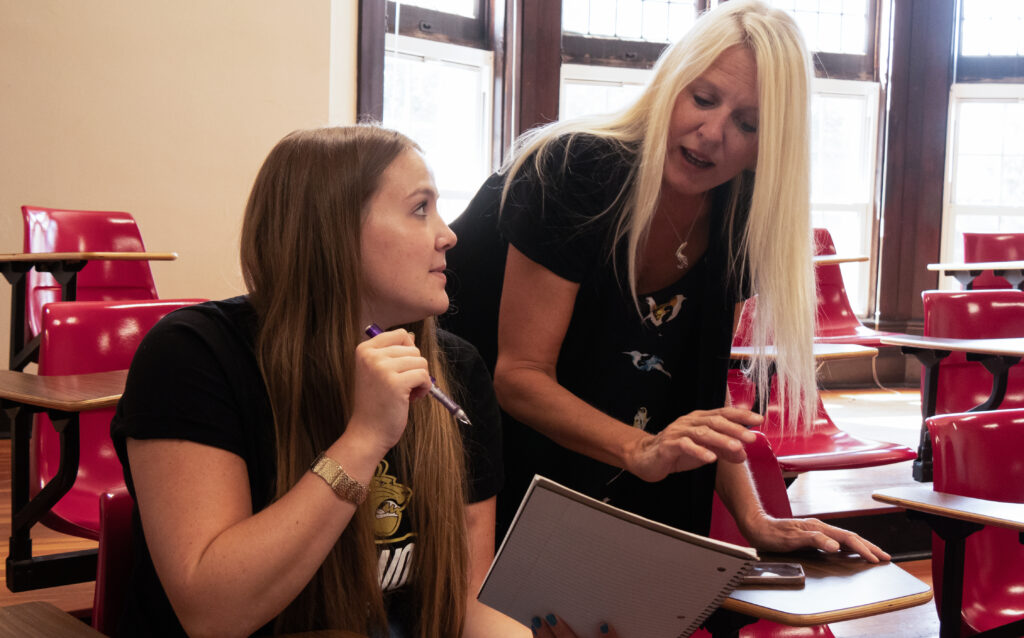Master’s in Early Intervention in Autism & Sensory Impairments
Make an Impact on Early Development
Meet the needs of families with children who have autism and sensory impairments with Lindenwood University’s online Master of Arts in Early Intervention in Autism and Sensory Impairments program. This early intervention master’s program online trains educators and professionals to work with parents and caregivers of young children who need special attention when it comes to sensory needs.
Through our master’s in early intervention program, you will explore these three areas: autism spectrum disorder, deaf/hearing impairment, and vision impairment. The comprehensive early intervention graduate program curriculum focuses on topics that include the characteristics and strategies for working with infants and young children, family-centered practices, communication and collaboration strategies, social-emotional development, evidence-based practices, and designing effective classrooms.
The master’s in early intervention program does not provide teacher certification from the Missouri Department of Elementary and Secondary Education.
Program at a Glance
24 months
Duration
33
Credit Hours
$551
Cost per Credit
100%
Online

Course Spotlight
Your master’s in early intervention coursework is designed to develop your approach to facilitating early childhood development opportunities through the lens of autism spectrum disorders and sensory impairments. Gain advanced insights across education and early development, refined through concepts related to the autism disorder spectrum and sensory disorders, including the following course topics:
- Conceptualization of Education
- Characteristics of Young Children with Autism Spectrum Disorders
- Transitioning to the IEP: Working with Families to Navigate the Early Intervention
- Characteristics and Strategies for working with Infants and Young Children with Vision Impairments
Career Outlook
Graduates can pursue fields such as special education and speech language pathology. According to the U.S. Bureau of Labor Statistics (BLS), speech language pathologists earn a median annual salary of $79,060. Special education teachers can earn up to $61,820 annually.
Admissions Requirements
For admission to your program, you will need to complete your online application and submit the following documents:
- Online application
- Résumé
- Letter of intent/personal statement, including a personal statement regarding your interest in the program and career goals
- Official undergraduate transcript(s) as well as official transcript(s) from any graduate school(s) attended
- Transcripts demonstrating completion of undergraduate degree in related field with a minimum of a 3.0 GPA in all major coursework.
- The official results from the Graduate Record Examination (GRE) may be required if GPA is below 3.0.
- Contact information for three academic and/or professional references.
- 1,000-word statement of purpose describing applicant’s goals.
- Specific deliverables depending on area of study, such as a writing sample and/or portfolio of work.
Tuition Details
The cost per credit hour for this program is $551. Besides affordable tuition, we offer a generous transfer policy of up to nine credits toward your degree completion to further offset tuition costs—saving you time and money on your education!
Why Choose Lindenwood University Online?
Since 1832, Lindenwood University has served students worldwide with affordable, high-quality academic programs providing real experience and real success. After nearly 200 years of academic excellence, Lindenwood is committed to a set of core values, including integrity, dedication, excellence, creativity, and community.
Quality
We evolve our online degree programs to reflect the latest in academic research and innovation and to meet the top standards of higher education.
Affordability
We are committed to offering our students studying online low tuition rates on top of multiple ways to save on your education.
Career-Focused
Our programs align curriculum to industry realities from experienced instructors who share real-world insights.
Support
We employ experts who are dedicated to helping our students with financial aid planning, enrollment counseling, tutoring services, and more.
We are committed to helping you succeed.
Throughout each step of your online degree program, you will receive support. From enrollment and tuition planning to staying on the right track, your support team is there to ensure your success.
